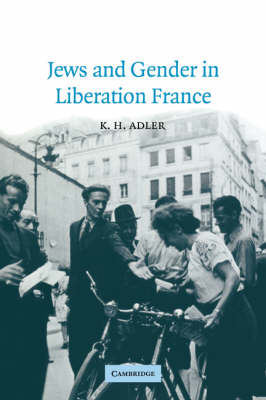
Jews and Gender in Liberation France
Seiten
2003
Cambridge University Press (Verlag)
978-0-521-79048-2 (ISBN)
Cambridge University Press (Verlag)
978-0-521-79048-2 (ISBN)
This book takes a new look at France during and after the German occupation. It challenges traditional chronology that concentrates on the Vichy government and punctures standard interpretations that divide occupied France into resisters and collaborators. Throughout, race - specifically Jewishness - and gender are drawn together in original and illuminating ways.
This book takes a new look at occupied and liberated France through the dual prism of race, specifically Jewishness, and gender - core components of Vichy ideology. The imagining of liberation and the potential post-Vichy state, lay at the heart of resistance strategy. Their transformation into policy at liberation forms the basis of an enquiry that reveals a society which, while split deeply at the political level, found considerable agreement over questions of race, the family and gender. This is explained through a new analysis of republican assimilation which insists that gender was as important a factor as nationality or ethnicity. A new concept of the 'long liberation' provides a framework for understanding the continuing influence of the liberation in post-war France, where scientific planning came to the fore, but whose exponents were profoundly imbued with reductive beliefs about Jews and women that were familiar during Vichy.
This book takes a new look at occupied and liberated France through the dual prism of race, specifically Jewishness, and gender - core components of Vichy ideology. The imagining of liberation and the potential post-Vichy state, lay at the heart of resistance strategy. Their transformation into policy at liberation forms the basis of an enquiry that reveals a society which, while split deeply at the political level, found considerable agreement over questions of race, the family and gender. This is explained through a new analysis of republican assimilation which insists that gender was as important a factor as nationality or ethnicity. A new concept of the 'long liberation' provides a framework for understanding the continuing influence of the liberation in post-war France, where scientific planning came to the fore, but whose exponents were profoundly imbued with reductive beliefs about Jews and women that were familiar during Vichy.
Karen Adler is Research Fellow, Department of History, University of Nottingham.
List of illustrations; Abbreviations; Acknowledgements; 1. Introduction: the long liberation; 2. Narrating liberation; 3. Anticipating liberation: the gendered nation in print; 4. Limiting liberation: 'the French for France'; 5. Controlling liberation: Georges Mauco and a population fit for France; 6. Liberation in place: Jewish women in the city; 7. Conclusion; Notes; Bibliography; Index.
| Erscheint lt. Verlag | 7.8.2003 |
|---|---|
| Reihe/Serie | Studies in the Social and Cultural History of Modern Warfare |
| Zusatzinfo | 2 Maps; 1 Halftones, unspecified |
| Verlagsort | Cambridge |
| Sprache | englisch |
| Maße | 160 x 235 mm |
| Gewicht | 600 g |
| Themenwelt | Geschichte ► Allgemeine Geschichte ► Neuzeit (bis 1918) |
| Geschichte ► Allgemeine Geschichte ► 1918 bis 1945 | |
| Geschichte ► Allgemeine Geschichte ► Zeitgeschichte | |
| Geisteswissenschaften ► Geschichte ► Regional- / Ländergeschichte | |
| Geschichte ► Teilgebiete der Geschichte ► Kulturgeschichte | |
| Geschichte ► Teilgebiete der Geschichte ► Sozialgeschichte | |
| Sozialwissenschaften ► Soziologie ► Gender Studies | |
| ISBN-10 | 0-521-79048-4 / 0521790484 |
| ISBN-13 | 978-0-521-79048-2 / 9780521790482 |
| Zustand | Neuware |
| Haben Sie eine Frage zum Produkt? |
Mehr entdecken
aus dem Bereich
aus dem Bereich
Europa 1848/49 und der Kampf für eine neue Welt
Buch | Hardcover (2023)
DVA (Verlag)
CHF 67,20
Giordano Bruno - ein ketzerisches Leben
Buch | Hardcover (2024)
C.H.Beck (Verlag)
CHF 41,85


